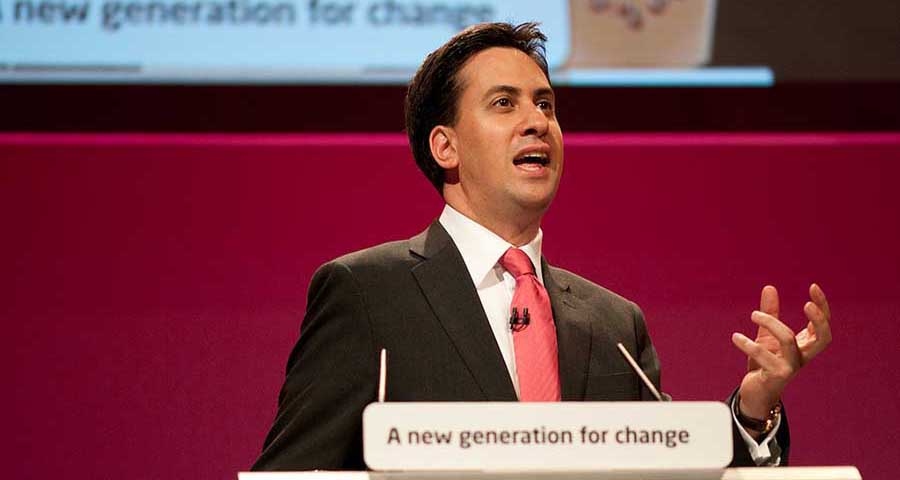
- Blogs
- Posted
Will 200,000 homes pledge undermine Labour’s green claims?
Ed Miliband has said that the UK will build 200,000 homes per year if Labour gets into government, while promising to make the UK a “world-leading green economy." If such assertions are mutually exclusive, then they must be treated as hollow rhetoric, indistinguishable from David Cameron’s husky hugging stunt and unfulfilled pledge to lead the “greenest government ever.”
The UK can make no claims to be a green economy unless genuinely robust sustainability requirements are applied to construction – with a particular emphasis on highly energy efficient building fabric, built to endure and therefore “lock in” energy and carbon savings for the lifespan of each building. A full 16 years after nations around the world including the UK agreed to cut carbon emissions under the Kyoto Protocol, little progress has been made. New buildings must be part of the solution to the threats posed by climate change and energy security – not part of the problem.
So Miliband’s proposed 200,000 homes must not be built to either the levels proposed for 2014 Part L – including a risible 6% carbon reduction on mediocre current standards – or the Zero Carbon Hub's proposed "allowable solutions" for zero carbon homes (which the UK government has put out to consultation till 15 October). A target like zero carbon homes may make for a nice sound bite, but the fact that the proposed route to get there includes carbon offsetting – and not just on site, but in the form of purchased carbon permits – is a clear sign of its futility. My hypothesis is this: there's no excuse for building new homes in 2013 knowing full well that they'll need to be retrofitted at a later date – and at considerable avoidable extra cost – in order to meet long term targets to reduce energy consumption and carbon emissions. The Liberal Democrats have pledged to make all homes in the UK meet Enerphit, the passive house standard for energy upgrade projects, by 2050. Will Labour's 200,000 homes per annum be built to a lower standard than Enerphit? Is Labour really proposing to build lower quality new homes that the owners may be forced to upgrade within the lifespan of their mortgages – almost certainly at significant cost to the UK taxpayer, given that subsidies will be required to motivate people en masse? As the disastrously low uptake of loans under the nascent Green Deal demonstrates, it’s genuinely vexing to stimulate the en masse retrofitting of existing buildings. New build is the easy bit, so there's no excuse for failing to build homes right in the first place.
Miliband may be thinking that moderate improvements are justified by Voltaire's assertion that "The best is the enemy of the good". He may think that an incremental improvement to Part L – or even the proposed zero carbon standard – is sufficiently "good", although it looks decidedly mediocre in contrast to the 60% energy and carbon reductions that have been mandatory for new homes in Ireland since 2011. But in the case of energy efficiency, the good is the enemy of the best. Or more accurately, the mediocre is the enemy of the best – and even the enemy of the better. This is because it's harder to justify upgrading a moderately energy efficient building to genuinely low energy levels than is the case with a very inefficient building. The fuel bills are bad but may be just about affordable. The temperatures are uncomfortable but may be just about bearable. So if Labour don't insist that all new homes are genuinely robust low energy homes, they're effectively locking people into homes that are needlessly uncomfortable, costly to heat and perhaps untenably costly to upgrade in future.
To his credit, Miliband showed encouraging signs that he will not be cowed by developers in the face of a housing shortage, telling developers to "use the land or lose the land". He should go a step further and set genuinely robust requirements regarding build quality. Any economist worth their salt would tell him that setting high construction standards won't cause house prices to rise. The market determines what price it's prepared to pay for a given quality of property. By setting higher building regulations for, say, energy efficiency, Miliband would essentially be reducing land prices, as developers would deduct the extra estimated construction costs from what they're prepared to bid for the land. And if it turns out that the market matures to such an extent that buyers/tenants are prepared to pay more for quality, low energy buildings, then that's a good thing. After all, new housing has to compete for sales/rentals against existing housing stock, which often has the advantage due to likes of better location, more "character", settled communities and greater amenity. It might even give developers a competitive edge.







